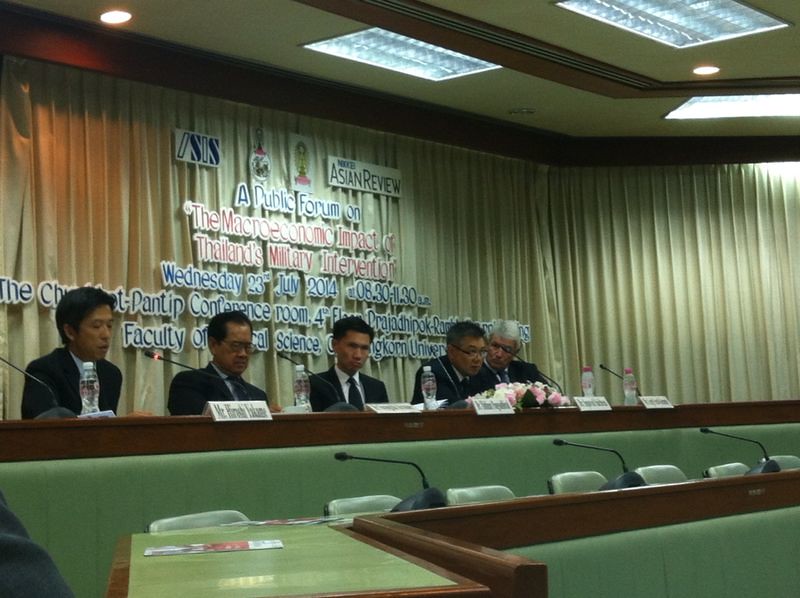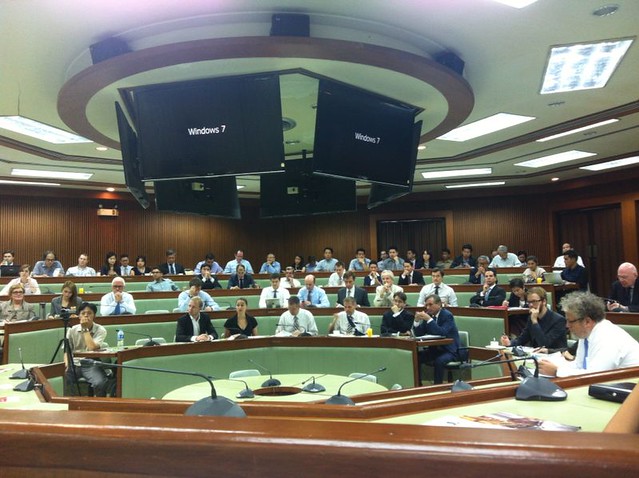Economists have expressed positive sentiments towards economic growth in Thailand after the military intervention. They lauded the military’s swift clamp down on corruption and recalibrated focus on the economy. The military’s actions have facilitated a better environment for growth and bolstered investors’ confidence.
On Wednesday, the Institute of Security and International Studies (ISIS), Chulalongkorn University, organized a public forum titled “The Macroeconomic Impact of Thailand’s Military Intervention”. Discussants representing both foreign and Thai organizations were unanimous in their views that the recent military coup has brought about economic stability and projected economic growth for 2015.
Panelists invited were Narongchai Akrasanee, Chairman of MFC Asset Management Plc,, Hiroshi Yakame, Regional head of Greater Mekong Sub-Region, Sumitomo Mitsui Banking Corporation, Leigh Scott-Kemmis, President of the Australian Chamber of Commerce, Thailand, and Supavud Saicheua, Managing Director of Phatra Securities Public Company Limited. The keynote address was delivered by Tetsuya Iguchi Editor-in-Chief, Nikkei Inc and the discussion was moderated by Thitinan Pongsudhirak, Director of ISIS Thailand.
It is noted that the junta’s National Council for Peace and Order (NCPO) has indicated a need for self-censorship and imposed heavy restrictions on the media and academics since it took the power on 22 May.
The discussants: (Left to Right) Hiroshi Yakame, Narongchai Akrasanee, Thitinan Pongsudhirak (Moderator), Supavud Saicheua, and Leigh Scott-Kemmis.
According to Narongchai, economic conditions improved when the military intervened. He said that it is proven through historical events that economic growth followed military intervention. A contraction in GDP was initially expected, but now we are looking towards a trajectory.
The Japanese have similarly welcomed the junta’s quick measures and attention towards the economy. Yakame acknowledged that the notion of ‘martial law’ and ‘coup’ sounded intimidating at first but “concerns have decreased” as the military ensured public services like transportation continued functioning.
Nine coups have taken place since the establishment of Japanese Chamber of Commerce but the Japanese have remained unwavering in their support of Thailand, he said.
While the Japanese have demonstrated their support towards Thailand, the same cannot be said for Australians. Scott-Kemmis stated that Thai trade and investment in Australia has surpassed Australian trade and investment in Thailand. This can be attributed to the Thai state’s poor productivity growth and lack of flexibility.
“Deteriorating enforcement of law has affected everything else,” he said and that it is necessary to “get back to an effective Rule of Law”. Additionally, Thailand’s “fragmented bureaucracy makes it difficult to effect change”, and as a result, the “banking and securities sectors are 50 years behind”. Therefore, the military has to step up on reforms and enforcement of the Rule of Law.
That being said, Scott-Kemmis has acknowledged that since the coup, more Thai associations have been coming forward with recommendations to enhance the business environment, he reckons that things are getting better in the post coup era.
Narongchai lets on that major tax and state enterprise reforms are on the agenda. There is a need to address enterprises that have a “propensity for losing money”. He proposes “less government and more governance” as Thailand requires a sustainable economy under good governance, whatever the mode of government.
Attendees of the public forum organized by ISIS on Wednesday
“The NCPO has tried to distinguish itself from corrupted civilian governments by coming down hard on corruption” said Supavund.
Narongchai said the 2014 coup is very different from the coup in 2006. “The 2006 military government was purely after Thaksin, akin to a Tom and Jerry race. Unlike the previous coup, the 2014 junta hardly mentioned Thaksin, and are more concerned with developing and improving Thailand”.
Despite all the positive vibes, the military continues to have its limitations. According to Thitinan, “the NCPO is trying to play God, but doing so is difficult”, the challenge now is for the military to clamp down on illegal activity evenly and ensure lasting results. Presently, the military has been taking swift action against mafia activity (Motorcycle taxis, airport taxis, lottery tickets) however, the difficult part will be to clamp down on “big fishes like the airport duty free monopoly”.


